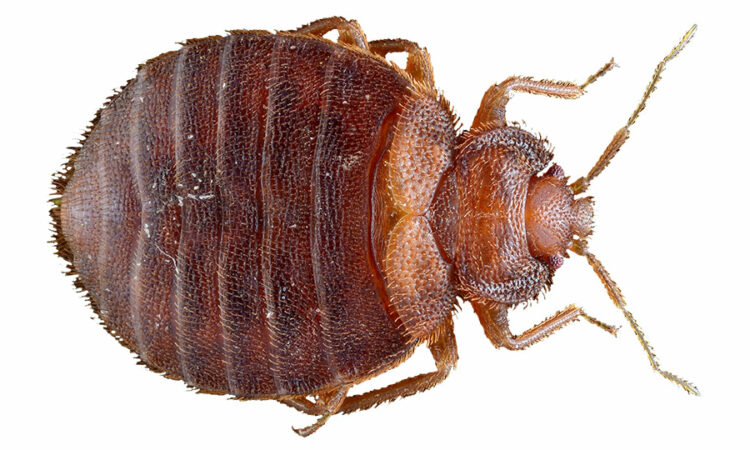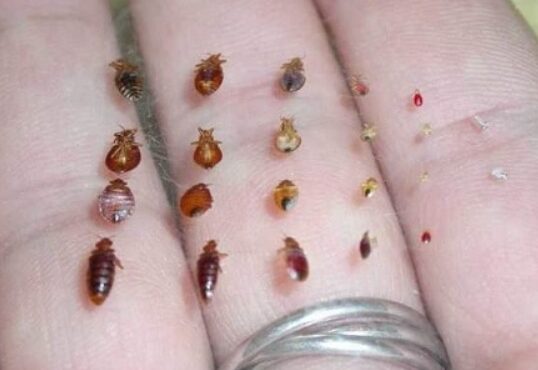Our goal is to share information and products that are truly helpful to renters.
If you click on a link or buy a product from one of the partners on our site, we get paid a little bit for making the introduction. This means we might feature certain partners sooner, more frequently, or more prominently in our articles, but we’ll always make sure you have a good set of options. This is how we are able to provide you with the content and features for free. Our partners cannot pay us to guarantee favorable reviews of their products or services — and our opinions and advice are our own based on research and input from renters like you. Here is a list of our partners.
Does renters insurance cover bed bugs?
Unfortunately, we have to tell you the bad news, that no (in most cases) your policy will not cover bed bugs. But we have lots of tips for preventing and getting rid of bed bugs, dealing with your landlord, and more. Read on.
Are bed bugs covered by renters insurance?
Unfortunately, bed bugs are considered a normal renters maintenance and a part of a tenant’s responsibility. Therefore, renters insurance does not cover bed bugs in most cases. Bed bugs do not fall under the category of an unexpected or sudden event, which is too bad because some estimates report 39% of bed bug infestations come from apartments and multi-family housing!
Other bed bug expenses typically NOT covered by rent insurance:
• Bed bug extermination
If you have to hire someone to exterminate bed bugs from your apartment, your insurance company will not pay for it.
• Furniture replacement due to bed bugs
If bed bugs destroy a mattress or a sofa, your renters insurance will not reimburse you for the replacement cost.
• Medical costs related to bed bugs
Renters insurance will not reimburse you to pay for co-pays or office visits to the doctor to diagnose bed bug bites or treat you for irritation from bed bug bites.
• Bed bug related alternative living expenses
If you have to temporarily move out while your bed bug problem is being resolved, your renters insurance will not reimburse you for those expenses.
Is my landlord responsible for paying for bed bug extermination?
It really depends on where the bed bugs came from — that is, the source of infestation. In many cases, yes, if you live in a multi-family unit building and other units also have bed bugs, your landlord is on the hook. If it turns out that you accidentally brought bed bugs home with you from your last vacation, it may end up being your responsibility to pay for their removal.
That said, you are likely protected by “habitability rights”, which means your landlord must provide a basic standard of living that includes safety, heat, structural sound building, and no pests! According to Lemonade, “In many cases, however, your landlord is legally responsible for eradicating the problem (and paying for it).” Some states have specific renter protections. California, Colorado, and Florida require the landlord to pay for the extermination in most multi-family complexes but do not pay for relocation or replacement of the mattress, etc. Check out our summary of renter rights in your area to learn more.
Your landlord should hire an exterminator to inspect not only your apartment but the apartments surrounding your unit to determine if there is a larger problem in the apartment complex. If it turns out the infestation is localized to your unit, you may be considered the responsible party.
However, if the exterminator discovers neighboring apartments with a similar problem, your landlord should be responsible for all costs related to the bed bug infestation.
What to do if your landlord refuses to exterminate bed bugs
If there are no laws where you live requiring your landlord to pay for bed bugs and you are certain the bed bug infestation came from a neighboring apartment, here are some things you can do.
- Formally request pest control from your landlord. Here are sample email/letter templates to use.
- Deduct the cost of extermination or withhold this money from your rent if allowed in your state.
- Report unlivable conditions to your local public health board.
- Contact your local tenants’ union for advice, up to including breaking your lease to move.
How to identify bed bugs
Since we were two years old, we have been bed bug experts. Ever hear the phrase, “goodnight, don’t let the bed bugs bite?” Yep, thanks, mom and dad. Night after night, we lay in the dark, imagining creepy crawlies on our skin until sleep finally takes over.
But has any of us actually seen a bed bug or could identify it if we had? Well, show and tell time, my friends!
This is what a bed bug looks like.

And for scale, this is how big they are depending on what stage of their life cycle they are in, and whether it is a female or male.

The long skinny ones are females, and the round fat ones are males (chuckle).
What are the signs of a bed bug infestation?
Bed bugs have the ninja skills of, well, a ninja and the stealth skills of an international spymaster. So, if they snuck into your home, don’t feel bad. Here are some ways to tell if you might have an infestation of bed bugs in your apartment.
- Skin shedding: Every time a bed bug molts (just a fancy word for taking off its coat), it leaves it just lying around rather than a rent-paying roommate that hangs their coat in the closet. Look for discarded skins in corners and creases of mattresses and couches or anywhere you think you may have a problem.
- Fecal matter: After chowing down on you, unfortunately, bed bugs leave fecal matter (totally rude, we know). These look like little brown dots the size of a pen dot or so. You will see them on the fabric of mattresses or chairs.
- Blood: Bed bugs bite. That much we all know. You may find small droplets of dried blood in sheets or notice discomfort at bite points.
- Eggs: Small and translucent, bed bug eggs are hard to see but they are visible to the naked eye. Again, check-in fabric folds and creases for signs of eggs.
- Live adult bed bugs: The most elusive of all the bed bug stages, like vampires, they hate the light and crave the night. It may be tricky catching sight of one, but, again, their favorite homes are our mattresses, sofas, chairs, so if you are on a hunting expedition, do it at night and in these places.
- Bed bug smell: Large bed bug infestations have an odor, kinda like the spice coriander.
How to get rid of bed bugs
Bed bugs are good hiders, overachievers in the reproduction department, and can go a whopping five months in between meals if they have to. If you can’t afford to hire a professional exterminator, which may be the fastest, most efficient way to get rid of bed bugs, there are some things you can do yourself but don’t expect to be rid of them overnight.
- Identify the infestation: Figure out where your bed bugs are hiding.
- Get rid of clutter: If you are a packrat, this may be the best reason you ever to de-clutter. Bed bugs love to hide in all sorts of places, so the fewer places they have to hide, the easier they will be to kill.
- Contain the infestation: A quick way to trap bed bugs is to vacuum everywhere, the carpet, couch, dresser, bed, etc. Seal the bag and throw it away. Then clean the vacuum.
- Wash all clothes and linens: Wash all your clothes and linen in hot water and dry them hot. If an item can’t be washed, put it in the dryer on high heat.
- Hot or cold: If you can’t wash it, either expose it to hot or cold or throw it out. Steam clean a mattress, for instance, or seal something up and put it in the freezer.
- Seal up hiding places: Once you’ve done steps 1-5, go through your apartment and seal up cracks in walls, wallpaper, baseboards, anything and everything that might be home to bed bugs.
- Chemical treatments: If you want to make extra sure you killed your bed bug infestation, use bug bombs or foggers.
- Call in the pros: If you’ve tried all this and still aren’t having success, you may need to call in an exterminator.
Your bed bug removal checklist
- Wire brush for scrubbing areas suspected of having bed bug infestation
- Ammonia-based products for cleaning surfaces
- Caulking and glue to close cracks and crevices in furniture and apartment.
- Steam cleaner to clean carpets
- Vacuum for sucking up bed bugs
- Thick garbage bags to contain the spread
- Window cleaners or liquid oxygen products to loosen eggs
- Fogger or bug bomb
Does renters insurance cover other types of pests?
Just like bed bugs, the prevention of other pests like rats or cockroaches is considered a regular maintenance issue and therefore not covered by renters insurance. There’s always going to be an exception to the rule, however, so if you have a unique situation, read your policy or ask your renters insurance company.
How to prevent bed bugs
These are just a few tips to help prevent a bed bug infestation from ever happening.
- Cover unused power outlets
- Store seasonal clothing in vacuum-sealed bags
- When staying in hotels, keep suitcases on the carpet and don’t place clothing in dressers.
- Never put your suitcase on your bed when you get home from vacation.
- Vacuum your entire apartment once or twice a week
- Declutter your home
- Use bed bug monitors: These handy devices go under the feet of the bed frame and prevent bed bugs from climbing into your mattress
- Always thoroughly check used items before purchasing them
- Avoid moving blankets: And while we highly recommend avoiding that blanket that is moving across the floor on its own towards you, we are actually talking about MOVING blankets, you know, the kind your movers use to protect your stuff while moving. You just don’t know where they’ve been.
- Use plastic bags instead of open containers in laundromats
Your renters rights, in your state.
Explore what you need to know.
- Alabama Renters Rights
- Alaska Renters Rights
- Arizona Renters Rights
- Arkansas Renters Rights
- California Renters Rights
- Colorado Renters Rights
- Connecticut Renters Rights
- Delaware Renters Rights
- Florida Renters Rights
- Georgia Renters Rights
- Hawaii Renters Rights
- Idaho Renters Rights
- Illinois Renters Rights
- Indiana Renters Rights
- Iowa Renters Rights
- Kansas Renters Rights
- Kentucky Renters Rights
- Louisiana Renters Rights
- Maine Renters Rights
- Maryland Renters Rights
- Massachusetts Renters Rights
- Michigan Renters Rights
- Minnesota Renters Rights
- Mississippi Renters Rights
- Missouri Renters Rights
- Montana Renters Rights
- Nebraska Renters Rights
- Nevada Renters Rights
- New Hampshire Renters Rights
- New Jersey Renters Rights
- New Mexico Renters Rights
- New York Renters Rights
- North Carolina Renters Rights
- North Dakota Renters Rights
- Ohio Renters Rights
- Oklahoma Renters Rights
- Oregon Renters Rights
- Pennsylvania Renters Rights
- Rhode Island Renters Rights
- South Carolina Renters Rights
- South Dakota Renters Rights
- Tennessee Renters Rights
- Texas Renters Rights
- Utah Renters Rights
- Vermont Renters Rights
- Virginia Renters Rights
- Washington Renters Rights
- West Virginia Renters Rights
- Wisconsin Renters Rights
- Wyoming Renters Rights
- Washington, D.C. Renters Rights
